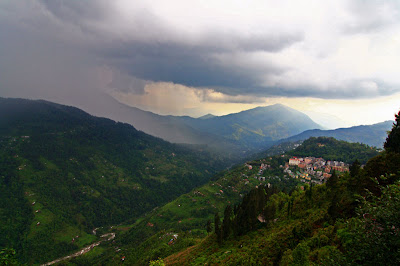 "Second time first, second time first," screamed Sonam, our friend, guide and driver. For a slightly sardonic guy not given to excesses of emotions this was a rare deviation in behaviour And indeed we were the first to arrive at the great Gurudongmar Lake on that day, located in North Sikkim at a gasp worthy altitude of 17,800 feet (around 5500 meters), where even our usually friendly oxygen calls it a day and takes off for the tropics.
"Second time first, second time first," screamed Sonam, our friend, guide and driver. For a slightly sardonic guy not given to excesses of emotions this was a rare deviation in behaviour And indeed we were the first to arrive at the great Gurudongmar Lake on that day, located in North Sikkim at a gasp worthy altitude of 17,800 feet (around 5500 meters), where even our usually friendly oxygen calls it a day and takes off for the tropics. For a phenomenal five minutes we lost our vocal chords as we took in the immensity of the lake and its guardian mountains, between laboured inhalations. Then the other cars started to arrive, some tourists dashing straight into the Buddhist temple to offer their prayers and others tending to their children already feeling the strain of oxygen poor air. It was still 7:45 in the AM and having left at around 4 from Lachen, I was unsure if I was experiencing the effects of altitude sickness or plain sleepiness. Either way the surroundings didn't let me dwell on such ridiculous matters of life and health.
For a phenomenal five minutes we lost our vocal chords as we took in the immensity of the lake and its guardian mountains, between laboured inhalations. Then the other cars started to arrive, some tourists dashing straight into the Buddhist temple to offer their prayers and others tending to their children already feeling the strain of oxygen poor air. It was still 7:45 in the AM and having left at around 4 from Lachen, I was unsure if I was experiencing the effects of altitude sickness or plain sleepiness. Either way the surroundings didn't let me dwell on such ridiculous matters of life and health.
This was after all a very spiritual place and an ancient energy made the air even more thick but not in a choking way. More like a security blanket. Guru Gobind Singhji had made this pilgrimage once on foot and consented to touch the water so that the lake wouldn't freeze over completely in the winter cutting off the only water source for miles. It's also a very holy place for Buddhists and the prayer flags struggling against the winds added a palatte of colour to match with the azure blue of the skies and water and the blinding white snow in the distance. You could drink this scene in. I'm sure it would've been cold and refreshing and hit the spot.

 But as the fluttering increased in intensity Sonam told us it was time for us to leave. More than 45 minutes at such a high altitude without the proper acclemitisation could mean trouble. And besides the moment the time neared 10 AM the wind decided to blow so strong that large rocks would get tossed around like dust.
But as the fluttering increased in intensity Sonam told us it was time for us to leave. More than 45 minutes at such a high altitude without the proper acclemitisation could mean trouble. And besides the moment the time neared 10 AM the wind decided to blow so strong that large rocks would get tossed around like dust. And so we left, straining our necks around to get that last glimse of the mighty Gurudongmar, with a silent word of thanks to the universe for sparing us the mountain sickness and letting us glimpse a wedge of heaven.
And so we left, straining our necks around to get that last glimse of the mighty Gurudongmar, with a silent word of thanks to the universe for sparing us the mountain sickness and letting us glimpse a wedge of heaven.


















































